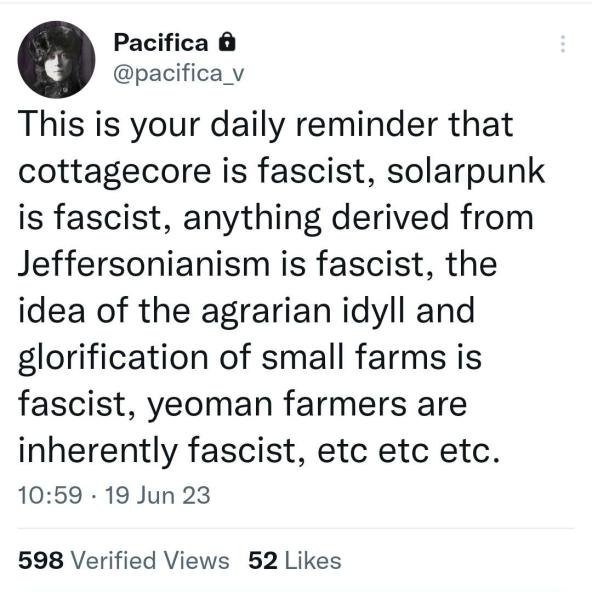I like the idea of being sustainable, growing your own food, and living naturally. I used to dream about starting a commune or homestead, but now I’m starting to think the idealization of it is petty bourgeois and part of the settler mindset. Starting some farm in the wilderness is very reminiscent of the western frontier, and the homestead act which I am myself a beneficiary of. We don’t need more socialists leaving society, we need more urban farming and an end to monoculture.
What do y’all think about it?
You can live off-grid if you are an able-bodied single between 20 and 40 years old with robust health and you don’t care for anything else in the world. You would have to endure harsh conditions and lots of physical labour, you get little in return if at all, but it is physically possible.
However, this changes if you introduce other people to the equation. The issue isn’t food, or even drinking water, it is things like heating, electricity, modern medicine, and sewage treatment. Children, pregnant women, elderly, sick, and disabled people require these things to boost their chance of survival. If you don’t want an infant mortality rate of 0.85 in your homestead, you better allow young mothers visit a proper hospital. The issue is, at that point what you’re doing is basically an amusement park attraction, a bubble of primitive society entirely embedded within the safety and stability of the modern world.
Worse still, building a society that largely made up of homestead communities is an AnPrim pipedream. It is the kind of shit to which you see civilisation regress in movies about a zombie apocalypse. The correct Marxist way to reach our ecological goals is to organise and develop a realistic plan to take control of society on top of its modern infrastructure.
You’d never have enough bodies to defend it even if you did manage to take it. Do you have access to bombers, dogfighters, drones, or anti-aircraft embankments? Nah. None of us do. It’s the same place I hit roadblocks trying to ‘modernize’ the concept of a true New Afrikan nation; is how do you set up shop in the Adversary’s backyard and then keep what you took? 'Cause keeping it a buck, even NFAC wasn’t managing that and to even get your foot in the door, you had to already own a rifle in the AR platform.
Likely a waste of time and effort, even if your only goal is to escape society.
I grow up in a homestead, and I must say, it is a fucking hard work, even if you have a tractor and many agriculture machines, what is expensive. That homestead has few hectares, so it is borrowed to someone else, since you cannot compete economically with rich land owners having 200 hectares and you go bancrupt. I do think that it doesn’t need to be the settler’s mindset. It depends on your objectives. Communists countries have sieckle in coat of arms by reason. Feeding people is providing them one of basic needs Working collectively with similarly minded people can produce something good and valuable, however agriculture now became industry for big land owners. It is very hard even for them, when the weather is bad, as it is, since capitalist suckers fucked up the climate, so we have dramatic droughts and rains and other shitfuckery. If you like growing plants, I would advise gardening for start. Even this may be expensive. Homestead can suck all your community money. But maybe my experience is not generalizable and you find some area. Anyway, good luck comrade!
I like the idea of being sustainable, growing your own food, and living naturally. I used to dream about starting a commune or homestead, but now I’m starting to think the idealization of it is petty bourgeois and part of the settler mindset.
It absolutely is the settler mindset. Homesteading is an economically stagnant practice at best. Homesteading served a few historical functions. First, it was an outlet for the downwardly mobile classes of Europe (at first, just England) to escape the monopolization and enclosures of land. Now, all these Europeans coming over for their homesteads had to come out, take land that was developed by other humans, destroy it, terraform, and fill it with European taxa (honey bees, apples, grass, mice, and salad weeds like dandelions), settle it, and defend it from recapture. Homesteading has been an occupation and colonization tactic of people and nature from the start, and Jefferson’s ideas turned it into a literal war tactic on Indian Country. In macro, homesteading was a way to have loyal settlers occupy territory for the high bourgeoisie to later expropriate. This takes the form of the land being seized on debt defaults, land sold to extractive (oil, mining) interests, land sold to real estate interests (suburbanization). Often times to pay the debts back the planters need to exploit the earth at greater and greater intensities, eating away at the soil environment until the land itself dies as in the case of the Dust Bowl (the victims of which, got free land seized in California and Washington from interned Japanese farmers).
Homesteading itself isn’t a real economic practice, it serves a specific function in colonization (of people and environment) and can’t exist independent from the larger market society. There is no way for it to be revolutionary, as it is an atomized form of the feudal village farmer, and only succeeded with the importation of outside labor (servants slaves and migrants). It’s a yearning for the life of a yeoman (who’s existence was a sign of Capitalism developing), and the greenwashing surrounding it calls back to not nature, but the total colonization of nature by man, in America it means turning a piece of Turtle Island into a model of Europe (looking at you, Solarpunk and Cottage Core).
Overall I think homesteading is poor use of land. We need collaborative and socialized food production so we can limit the amount of land necessary to meet the needs of our people. Homesteading as an escape from Capitalism is utopian and it failed over and over for the same reasons.
Cottage core is definitely petty-bougie, but what’s your problem with solarpunk? I’d like to see some vertical forests here. My model for solarpunk and China(high-speed rail, eco-cities), not Europe.
That one Chobani commercial is still a cornerstone in the Solarpunk “movement”, at least on social media (where I expect it lives and dies). There is a “de-advertised” version where someone took the time to remove all of the references to the dairy magnate. There is no criticism of the environment depicted in the art being full of colonizing species, only derision in it being produced by Chobani. This is worrying because the settlers in the settler states, even the “environmentally conscious”, can’t even imagine a form of living alongside nature, only a continent sized homestead. Environmental collapse is more than just carbon emissions and asphalt, the environments of the Americas have been collapsing ever since the colonizers came and exterminated tens of millions of bison, tens of millions of beavers, wolves, dammed rivers that wipe out salmon populations. It’s problematic that people here don’t know what nature actually looks like, especially those who play around with “revolutionary aesthetics”.
That ad is a nightmare. Vast patches of monoculture and tons of robots in the ecological “utopia.”
It’s also just… meaningless. It’s full of literal magic, like creating miniature clouds to water your garden. It’s eye candy, not anything -punk.
“Living in harmony with nature” for colonial corporations is when you have so much control that you decide when it rains.
I wouldn’t really call it “problematic” to not know what nature actually looks like. Nature isn’t virtuous by itself. The only problematic part is the tragedy of the scope of environmental destruction needed for people to not know what nature looks like.
We absolutely should avoid monocrops and a colonization mindset, but the fundamental ideas of SolarPunk aren’t those things.
It’s problematic that settlers in a settler colony don’t know what the environment looked like before their ancestors colonized the land. I’m not saying nature in the abstract but the specific environments of the Americas that were destroyed due to homesteading and colonizing. They want a return to “green” but that “green” is imported flora and fauna.
They can brainstorm all day but when it comes down to praxis, if they are reproducing settler Colonialism of the environment, they are a problem. If Solarpunks in the colonies don’t have an intimate understanding of their local native species, they are just colonizers, not much better than people who keep their lawn green.
Edit: relevant image I just ran into

Okay, that makes sense, my anprim sensors were overactive there for a moment.
I’m sure there are better and worse self titled “solarpunk” ideologies.
As someone that lives on a commune, homesteading isn’t real. At least in the imperial core of the US. It is nearly impossible to come out ahead homesteading in the US. Feed prices, hay, the back breaking labor of sowing and reaping entire fields just cannot compare with the affordability of the exploited labor of the third world, the factory farms, and the acres of hay fields.
Homesteading is a great way to learn skills and to build character, but it isn’t profitable in the US without several people holding normal jobs on top of the work. You will in all likelihood drown. The reason you see all those white people on YouTube talking about their homesteads and how close it makes them feel to nature is because they got money coming from somewhere else, and as somebody who has met some of these people it’s usually because they’re landlords or incredibly overpaid for a remote job.
Urban farming also has it’s drawbacks but I am less qualified to speak on that. What I will say is that you cannot get rid of rural farming and feed the cities, the land just is not there for it. The community gardens are great and a fantastic starting point, but you’re not even close to making bread for a small household in the community garden plot.
Homesteading and traditional land practices are coming to an end, if we are not already there. Agricultural land use is now all about monocultures that grow a metric fuckton of grain. Maybe there’s some orchards, those are less extractive. But traditional land practices are moving out of the way for tractors and excessive tilling and ploughing. Whenever I leave the farm all I see everywhere is shit land practices, people putting plastic in the ground to separate their beds from the disgusting peasant dirt under it, and invasive plants everywhere that no one bats an eye to, ecosystems out here are dying.
The ecosystems are dying but it simply is not sustainable to even do anything about it. Plus the land all belongs to the bourgeoisie who know the true value of factory farming and monocultures, making it prohibitively expensive for an eco- conscious proletariat. Even then when you do get the land, our sedentary imperial lives do not make our bodies strong for the labor we need to do, unlike the Zapatista comrades who can dig trenches for hours a day everyday. It destroys your body for years before it begins to feel normal. But despite all of this taking care of the land is a hellish feat that has to be done, lest we collect our grains from sand instead.
hot take: “building character” is a somewhat outdated concept that assumes that people can actually adapt to be happy while doing massive amounts of labor, as opposed to just learning to suffer in silence.
I don’t say this to suggest that the average United States citizen wouldn’t benefit from more physically focused labor, but just as a pedantic point based on my own (tbf entirely baseless oh god I just did a liberalism) views on human psychology
Oh yes, I was using the term facetiously. I do it a lot in-person, did not consider how it looks in text. A more accurate way to express it would be “getting perspective.”
I mean, it is a staple of reactionary and patriarchal “values.”
The reason you see all those white people on YouTube talking about their homesteads and how close it makes them feel to nature is because they got money coming from somewhere else, and as somebody who has met some of these people it’s usually because they’re landlords or incredibly overpaid for a remote job.
This reminds me of ‘the biggest little farm’ film, it looks so perfect, but they admit at the beginning they got tons of startup money from investors. Many of us acknowledge the petty-bourgeois nature of homesteading, and still fantasize about it. My brother was recently talking about how is dream life is moving to the river with his friends and living off a high paying easy remote job.
Homesteading and traditional land practices are coming to an end
It’s called the “green revolution” and it started a while ago. I wish it weren’t called such, because that’d be a great word for ecosocialism.
I see everywhere is shit land practices, people putting plastic in the ground to separate their beds from the disgusting peasant dirt under it, and invasive plants everywhere that no one bats an eye to, ecosystems out here are dying.
Every time I’m out on the road what i see sickens me. Barren fields, corn, apple, or soy monocultures, the only trees being trees of heaven.
Bourgeois “farmers” wreck the land with chemicals and monocultures fucking up the water cycle and carbon cycle, and they know the land will grow fallow, but they can just move on to the next venture they can suck profit out of. Reading ‘cows save the planet’ has made me hate mainstream farming ever more.
Im sure there are, like, 2 farmers that don’t destroy the environment out there, maybe even hundreds, but they can’t fix the environmentally destructive nature of capitalism by themselves
Exactly, that’s part of my criticism of ‘cows save the planet’ (which I keep mentioning because I just finished reading it). The author criticizes capitalism and talks about how large companies and institutions crush more sustainable farming, but she doesn’t really have a solution. Her only hope in the future seems to be more people recognizing her superior method, and using the practices on their personal property. All her positive examples are just petty bourgeois people who happened to pick up a book. She can’t imagine an alternative to capitalism or a way to get there.
Interesting points but the one about the westerners not being suited for manual labor is a bit weird lol. Not everyone here sits on their ass all day eating garbage food.
I’m not implying that we’re basement dwellers, but the fact is that even a factory worker in the US (which I once was) lives a sedentary lifestyle compared to countries where agriculture is extracted. If you ever do an accompaniment with a Zapatista family you will see just how built different they are from the hard work they need to do from childhood.
Edit to add more: This is a pattern most US internationals experience when going out to revolutionary projects like those in the YPG/YPJ, Chiapas, and all the other ones. You can take the most built westerner and they will crumble before a comrade the same age who grew up in the harsher conditions. I’ve seen a man in his prime with tree trunks for arms and abs that could break melons ask for constant breaks while the fairly average looking Zapatista comrades could go for the full 12 hours with only 2-3. It’s just what they’re used to.
Maybe. It’s just that my experience as a Westerners, working as a carpenter and in a steel mill for years, makes we wonder how God tier the Zapatistas must be. Doing 8-10 hours a day of manual labor in the West does something to your physique as well.
But maybe you’re right. I’ve never had the chance to meet the Zapatistas.
zapatistas specifically, yeah they’re built different
But for the people of a lot of countries ravaged by imperialism, I wonder somewhat if the idea that they have a higher tolerance or developed a higher tolerance over their lifetimes for grueling labor is a myth, perpetrated by survivorship bias.
Pretty easy to think of people who live in countries that are being economically attacked as industrious, unrealistically strong-willed people, when the more likely case is that everyone who can’t work to that degree, either mentally or physically, just fucking starved to death.
I don’t think people are often able to get used to the suffering, I think anyone who can’t get used to it just gets tossed into the pile of imperialism’s victims.
The sickening thing is that there are people who exist who would realize that and then just argue it’s “natural selection”. Social darwinists should be executed unironically
I highly recommend seeking an accompaniment if you’re ever able to, they’re good people.
True, but we’re far less fit than the masses of any past mode of production.
I remember someone at r/antiwork that did the maths and started producing food for sale in local markets as a single worker, reaping the value of his own work. Apparently, after a lot of work he was making higher than minimum wage.
But I can’t find the link right now. I’ll continue looking for it and update this if I find it.
While the idea of homesteading sometimes conflicts with my political work, I think there is room for homesteading in a socialist society. Especially in a way of urban or even rural farming with the focus on ending monocultures. We could even start commune like groups to provide for our people.
I myself dream of having a homestead one day. I’d love to be able to provide for myself, work on a piece of land and possibly share my work with others for free. I don’t need a big house to live in and it would preferably be in nature.
My father in law recently bought a piece of land in the middle of nowhere in Sweden. We’re going to build and renovate it with the family and homesteading may even be an option.
I… don’t think it is, per se.
It kinda depends on the context; not really a planter class or settler mindset, but it depends on the time-period.
In addition, what’s your opinion of permaculture? I’m going to one of the pyramid scheme classes soon, to see if there’s anything worth taking from it. From what I’ve heard by the anarchist critics at ‘poor proles almanac’ it’s basically the dogmatic imposition of a white dudes interpretation of a unique indigenous practice in Australia to the whole world. It seems like it’s probably better to just look at the practices of indigenous people from your specific region, rather than using general permaculture.







